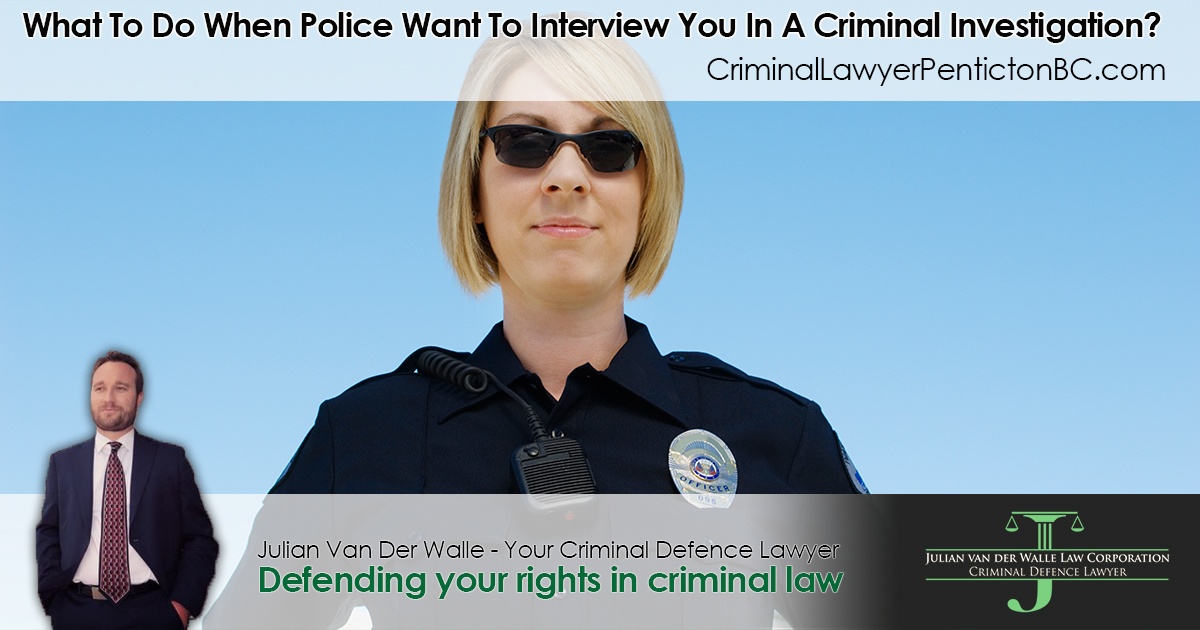What to Do When Police Want to Interview You in a Criminal Investigation

Criminal investigations are commonplace and occur on a daily basis for all sorts of crimes ranging from petty theft offenses to more serious charges such as arson, rape or murder. The range of police interviews is similarly broad and can range from benign encounters that amount to little more than “did you know this person and if so, what do you know about them?” to criminal investigations in which you may be the prime suspect.
Generally speaking, when the police want to talk to you they are either investigating you for a crime or they are investigating someone else for a crime. If they are investigating you, you should exercise your right to silence and refuse to answer any of their questions. Your silence can never be used against you, it has no evidentiary value in court.
When the police interview you, you do not have the right to have a lawyer present in Canada. You only have the right to speak to a lawyer prior to the police interviewing you. You often will only be entitled to one phone call prior to the police beginning their questioning of you. It is critical that you do not create more evidence against yourself by giving the police a confession. Many people are convicted or found guilty because of their own confession, without which the Crown would never have been able to prove the case against them. Do not be one of the dumb guys and tell on yourself.
Assuming You Are NOT Suspected of a Crime
Simply go to the interview and be honest. Police interviews are fairly common occurrences and not all interviews begin because the police suspect you of anything at all. However, you should be sure to quickly confirm what the interview will be about, just to make sure you know what the circumstances of the interview will be. Do not feel pressured to meet the police’s interview timetable. If you are busy when they ask you to come, simply ask to reschedule.
Assuming You May Be Suspected of a Crime
Make sure that you know and understand your rights.
- There is NEVER a requirement that you give any kind of police statement. More than half of all police convictions occur because a confession was given to police at some point during the process. While police statements may appear to be benign, there is always a reason that the police ask you to provide statements on certain issues. Assume that the police are attempting to back you into a confession.
- There is NEVER a requirement that you report to the police station to give a statement. The only instance in which you will be required to come to the police station to give a statement is if you have been arrested. In all other cases, you are always free to come and go as you please.
- There is NEVER a situation in which you should talk to the police before consulting with a lawyer. Criminal lawyers help clients prepare for police investigations all the time, and as a result, criminal lawyers tend to know a lot about police tactics and how and why police phrase their questions.
- Remember: exercising your right to remain silent can NEVER be used against you in court. Canadian law allows you the right to not talk to police even if you are called to the police station for an interview. Generally, you should always air on the side of caution and avoid talking to police, even if you do not expect them to use your statement against you.
In sum, if you believe that you may have been called to give a police interview because you may be a criminal suspect, you should make sure to understand your rights, know the potential consequences of an interview, and consult with a lawyer to plan your next move.
Related Stories
Why You Should Hire a Vernon Criminal Defense Attorney
As a whole, the Canadian justice system is very fair. The accused enjoy the right to be present and be heard in court, the right to remain silent, and the right to representation by legal counsel. That last right is one of the most important rights of all. This is...
Does drug addiction cause more crime?
Many in Canada often associate drugs with crime, and in many cases, the possession or use of drugs is itself a crime. More recently, a spotlight has been placed on drug-related incidents due to the opioid crisis afflicting the nation. Sociologists have spent decades...
Bad IRP Decision? What Can You Do About It?
Bad IRP Decision? What Can You Do About It? Drivers who are caught driving under the influence by the police may receive an Immediate Roadside Prohibition (IRP) on driving. An IRP is a temporary driving suspension that prevents the recipient from driving for a set...
REQUEST A FREE CONSULTATION
Call 1.866.706.8857
Or fill out the form below to receive a free and confidential initial consultation.
